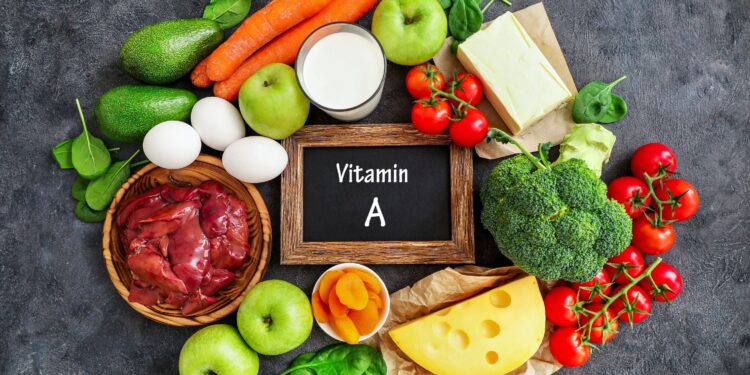Vitamin A is often regarded as one of the most important nutrients for maintaining healthy health. It is found naturally in a variety of foods and is accessible as a supplement. It is required for a number of body activities.
Let’s look at why vitamin A is so important and how to make sure you receive enough of it.
What is Vitamin A?
Vitamin A is a fat-soluble vitamin that helps to retain vision, promote growth and development, and support immunological function.
There are two main types of vitamin A: retinoids and carotenoids.
- Retinoids: These are the active forms of vitamin A found in animal products like liver, fish, and dairy.
- Carotenoids: These are found in colorful fruits and vegetables, and the most well-known carotenoid is beta-carotene.
Once consumed, the body transforms carotenoids into retinoids as needed. This conversion is especially crucial for people who eat predominantly plant-based foods.
Why is Vitamin A Important?
- Vision: Vitamin A is essential for keeping good vision, particularly at night. It helps the eyes adjust to variations in light, and a lack of it can result in night blindness and other vision issues.
- Immune function: Vitamin A is required to keep the immune system healthy. It regulates the immune response to infections, making it more difficult for illnesses to take hold.
- Skin Health: It promotes the health of the skin and mucous membranes, which serve as protective barriers against bacteria and viruses. This is critical for wound healing and skin cell integrity.
- Reproductive Health and Growth: Vitamin A is essential for proper reproductive function and embryonic development. It is essential during pregnancy and infancy for proper growth and development..
Sources of Vitamin A
- Animal Sources: Animal sources include liver, fish liver oils (such as cod liver oil), egg yolks, and dairy products, all of which contain preformed vitamin A.
- Plant Sources: Colorful fruits and vegetables such as carrots, sweet potatoes, spinach, and kale contain beta-carotene and other carotenoids that the body can convert into vitamin A.
- Fortified Foods: Some foods, such as morning cereals and dairy alternatives, are fortified with vitamin A to assist consumers fulfill their daily requirements.
Vitamin A Deficiency and Toxicity
- Deficiency: A shortage of vitamin A can cause a variety of health issues, including night blindness, dry skin, increased susceptibility to infections, and, in extreme cases, total blindness.
- Toxicity: On the other hand, excessive vitamin A intake, particularly via supplements, can result in toxicity. Symptoms may include nausea, dizziness, headache, and, in severe cases, liver damage. It is critical not to exceed the recommended daily intake amounts.
How Much Vitamin A Do You Need?
The recommended daily dose of vitamin A varies with age and gender. Adults’ recommended dietary allowance (RDA) is approximately 700-900 micrograms per day, with larger quantities required during pregnancy and breastfeeding.
To summarize, vitamin A is an essential nutrient that benefits several aspects of health, including vision, immunological function, and skin health.
Include a range of vitamin A-rich foods in your diet, such as liver, fish, dairy, and colored fruits and vegetables, to ensure you get enough of this critical ingredient.
To avoid potential health hazards, it is critical to limit supplementation. Accept the benefits of vitamin A for a better lifestyle!
ALSO READ: Egg Intake and Its Health Benefits












